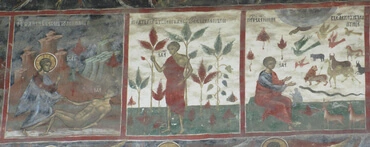Explanation of Genesis 2:20
By Brian David

The Lord had shown the people of the Most Ancient Church (Adam) the spiritual gifts of their celestial state, their state of love to the Lord. He had shown them the loving affections (beasts of the field), the inspired thoughts (fowl of the air) and the life that filled their spiritual existence (living creatures). And the people recognized the nature of those things, and where they came from (they gave them names).
But it was not enough. The people wanted to lead themselves and feel life as their own. They did not want to be in the highest celestial state anymore.
(References: Arcana Coelestia 142, 143, 144, 145)
Apocalypse Revealed #426
426. They were told not to harm the grass of the earth, or any green thing, or any tree, but only those men who do not have the seal of God on their foreheads. (9:4) This symbolizes the Lord's Divinely providing that they be unable to take away any truth or good of faith, or any affection for or perception of these, from any others than people lacking in charity and so having no faith.
Their being told symbolizes the Lord's Divinely providing, because they were told from heaven. Their not harming the grass of the earth, or any green thing, symbolizes their inability to take away any truth or good of faith; for grass symbolizes the truth of faith that is born first in a person (no. 401), and a green thing symbolizes the life force in faith, which springs from goodness (no. 401). Their not harming any tree symbolizes their inability to take away any affection for or perception of truth and goodness; for a tree symbolizes a person in respect to these (no. 400). Those men not having the seal of God on their foreheads symbolize people lacking in charity and so having no faith; for the forehead symbolizes love and charity (no. 347), and having the seal means, symbolically, to know them and distinguish them from others (no. 345).
[2] People who have affirmed faith alone to the point of embracing the mysteries of justification and salvation by it are unable to take away any truth or good of faith, or any affection for or perception of these, from any others than people lacking the faith that accompanies charity, because scarcely anyone comprehends them other than the prelate who teaches and preaches these. The layman hears them, but they fly in one ear and out the other, as the mystery-preaching priest himself may know for certain from the fact that he himself spent the whole force of his genius on learning them in his youth, and afterward on retaining them in his later age, and from the fact that he reckons himself especially well-educated on account of them. What then does the layman comprehend who, when he hears these mysteries, thinks in simplicity of the faith accompanying charity?
It can be seen from this that a justifying faith alone is the faith of the clergy, and not of the laity, except in the case of those who live heedlessly. The latter learn from the clergy's mysteries only that faith alone saves, that they cannot do good of themselves, that neither can they fulfill the law, and that Christ suffered for them, along with a few other general tenets like these.






